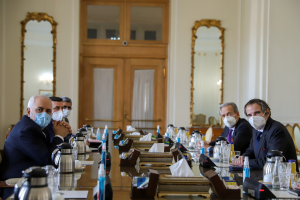A joint Council and IranPoll survey shows that although Iranian and American public support for the Joint Comprehensive Plan of Action has waned over time, there is still sizable backing for it in both countries.
If the United States “Fulfills its Obligations”
Both the Biden administration and the Iranian government have said they aim to return to the original Joint Comprehensive Plan of Action (JCPOA, or the Iran deal). But both sides are asking the other to adhere to the deal’s original conditions before doing so. The United States wants Iran to return to all the limits on nuclear enrichment and stockpiles specified in the JCPOA, while Iran has called for the United States to lift all sanctions per the original JCPOA as well as the additional new sanctions imposed by the Trump administration in violation of the agreement. Meanwhile, joint Chicago Council on Global Affairs and IranPoll survey results show that although Iranian and American public support for the agreement has waned over time, there is still sizable backing for it in both countries. The results suggest there is an opportunity for the United States to rebuild some credibility with the Iranian public if it returns to the agreement. But there may be significant resistance in Iran, even from the public, to negotiations about Iran’s missile program or other nonnuclear activities.
Key Findings
- About six in ten Americans favor US participation in a nuclear deal with Iran and half of Iranians (51%) approve of the JCPOA. This is the highest percentage of Iranians supporting the JCPOA since May 2019 though much lower than levels of support in 2016–2017, before the United States withdrew from the accord in 2018.
- Seven in ten Iranians (69%) support their country returning to the limits called for under the nuclear agreement if the United States begins fulfilling its obligations under the JCPOA.
- Even if the United States does return to the Iran agreement, a majority in Iran think it is unlikely the United States will live up to its obligations under the agreement (60%, versus 37% who think it is likely).
- Half of Iranians think it is at least somewhat likely that the economic sanctions against their country will be eased during the Biden administration (50% likely, 45% unlikely). Even so, a majority expect no change in US-Iran relations during the Biden presidency (57%).
- Only 28 percent say that if the two sides return to the original terms of the JCPOA, Iran should be willing to negotiate a separate agreement about its missile program.
Majorities of Americans and Iranians Support Nuclear Agreement, but Iranian Support Has Waned
During his election campaign, President Joseph Biden promised that the United States would rejoin the nuclear deal with Iran given that Iran returned to the original conditions of the deal. Iranian President Hassan Rouhani welcomed the election of Biden last November, describing Biden’s desire to return to the JCPOA as an opportunity for the United States “to compensate” Iran for the economic losses it incurred as a result of the US withdrawal from the agreement.
A majority of Americans support a return to the nuclear deal, with nearly six in ten favoring US participation in the agreement that lifts some international economic sanctions against Iran in exchange for strict limits on its nuclear weapons (57%, including 74% of Democrats, 39% of Republicans, and 56% of Independents). Four in ten Americans (39%), including a majority of Republicans (58%), oppose US participation. Support for US participation is currently at its lowest level since 2016 (just slightly lower than 60% in 2016 and 61% in 2017), particularly among Republicans.
Democrats and Republicans Diverge on Iran Agreement
Based on what you know, do you think the United States should or should not participate in the following international agreements? (% participate) The agreement that lifts some international economic sanctions against Iran in exchange for strict limits on its nuclear weapons
Source:
January 29-February 1, 2020 | n = 1,021
Chicago Council Survey
For their part, many Iranians have soured on the deal over the past six years. But support is currently on an upswing. According to a January–February 2021 survey, 51 percent of Iranians approve of the JCPOA, up from 2019 and 2020 readings, when fewer than half supported it. But current readings are far below the solid majority support registered between 2015 and 2017.
Iranians More Likely to Approve Than Oppose JCPOA
As you may know, in July 2015, Iran and the P5+1 countries reached a comprehensive agreement in regard to Iran’s nuclear program, which is also known as the JCPOA. In general and based on what you know about the JCPOA, to what degree do you approve or disapprove of this agreement? Do you: (%)
Source:
January 29-February 1, 2021 | n = 1,021
University of Maryland-IranPoll Surveys
Iranians Support Rejoining Deal If Both Parties Fulfill Obligations
While the Biden administration is insisting on Iran’s return to compliance, Iran wants the United States to lift the sanctions re-imposed upon then-President Donald Trump’s exit from the deal as well as the additional sanctions imposed after the United States withdrew, and other assurances. The data show that if Iran senses a good-faith effort from the United States, it would be willing to support a return to the original terms. Seven in ten Iranians say they mostly support Iran returning to the limits called for under the JCPOA if the United States begins fulfilling its JCPOA obligations (69%; 23% mostly oppose). But even if the United States does return to the Iran agreement, the University of Maryland-IranPoll survey shows a majority think it is unlikely the United States will live up to its obligations under the agreement (60%, versus 37% who think it is likely). It will be a challenge to convince Iranians that the United States is committed to the nuclear agreement beyond the current presidential administration, especially after the 2018 US withdrawal.
Sequencing the terms of compliance will be key for Iranian public support. A majority of Iranians (55%) agree that the United States and Iran should fulfill their obligations at the same time. But the greater majority prefer that the United States return to the agreement first. According to the University of Maryland-IranPoll survey results, nearly nine in ten (88%) prefer that Iran fulfill its obligations under the JCPOA after the United States is in full compliance. Seven in ten Iranians (69%) say their country should not hold any talks with the United States until Washington returns to the JCPOA and fulfills all of its obligations. And only 32 percent agree that Iran should make the first move and have the IAEA certify that Iran is in full compliance so that the United States would rejoin the agreement.
Fulfilling JCPOA Obligations
As you may know, both Iran and the Biden administration have said that they would completely fulfill their obligations under the JCPOA if the other party also complies fully with the terms of the JCPOA. I will now read some ways that this could be achieved. Please tell me whether or not you agree with each of these ways: (%)
Source:
January 26-February 6, 2021 | n = 1,008
University of Maryland-IranPoll
Iranians Expect Economic Benefits
A majority in Iran believe economic conditions in Iran will at least somewhat improve if the United States and Iran fulfill the original obligations of the nuclear agreement (57%). Less than half say the economic conditions for ordinary Iranians would also improve (45%). In addition, if both countries return to the original terms of the deal, nearly half say that would make it easier for the United States and Iran to try to resolve other problems (47%).
Return to JCPOA Could Help Resolve Issues
As you may know, our country has many problems and differences with the United States. If both the United States and Iran start to fully comply with the terms of the JCPOA agreement, do you think this will make it easier or more difficult for the two countries to try to resolve other existing problems or will it have no significant effect?
Source:
February 8-28, 2021 | n = 1,006
University of Maryland-IranPoll Surveys
Iranians Expect Economic Improvement through Return to JCPOA
If both United States and Iran start to fully comply with the terms of the JCPOA nuclear agreement, do you think the [.....] will in general: (%)
Source:
February 8-28, 2021 | n = 1,006
University of Maryland-IranPoll Surveys
Iranians See Biden as Less Hostile toward Iran, but…
Half of Iranians think it is at least somewhat likely that the economic sanctions against their country will be eased during the Biden administration (50% likely, 45% unlikely). The University of Maryland-IranPoll survey results show that on a scale of zero to 10, with zero being completely hostile and 10 being completely friendly, just 29 percent rate Biden’s policies a zero, denoting completely hostile, compared to 70 percent who said the same about Trump’s policies. But when looking at the overall means, the average rankings land in the hostile zone for Biden and Trump. Iranians give Biden’s policies a mean of 3 out of 10 versus a 1 out of 10 for Trump’s policies. While 58 percent of Iranians think the United States will rejoin the JCPOA under Biden, the Chicago Council-IranPoll survey finds a majority expect no change in US-Iran relations during the Biden presidency (57%). Among the remainder, more Iranians expect that relations will improve (28%) than worsen (9%).
Americans are almost divided evenly into thirds: 37 percent expect no change between Iran and the United States during the Biden administration, 31 percent expect relations will improve, and 30 percent expect they will worsen.
Iranian Public Rebuffs Additional Negotiations on Missiles
In a recent letter to Secretary of State Antony Blinken, 70 Democratic and 70 Republican House members called for the Biden administration to seek a comprehensive deal with Iran that addresses not just its nuclear activities but also other security issues, including its missile program. Asked about the possibility of negotiating with the United States on other issues if the United States returns to the Iran agreement, a majority of Iranians say they would be open to this idea only after the United States complies with the terms of the deal for a few years (54%) than to agree immediately to negotiate with the United States (12%).For most Iranians, however, this does not include discussions about Iran’s missile program. Six in ten Iranians (62%) believe that even if the two sides return to the original terms of the JCPOA, Iran should be unwilling to negotiate a separate agreement about its missile program (just 28% are willing).While Iranians don’t want negotiations to concern their missile program, a joint Chicago Council-IranPoll study from 2020 found that a majority of Iranians (59%) say their country should not develop nuclear weapons. They do, however, support a peaceful nuclear program (90%).
Nor does it seem that the public would welcome discussions about limitations on Iranian Revolutionary Guard Corps (IRGC) activities in the region. Nearly all Iranians believe the IRGC activities in the Middle East have made their country more secure (85%, with 56% saying it has made Iran a lot more secure). Only 11 percent think it has made the country less secure.
Conclusion
While support for the JCPOA has declined in the United States and Iran alike, majorities of the public in each country continue to support the plan. However, the United States’ withdrawal from the Iran nuclear deal has damaged its credibility with Iran as well as with US allies. Without the assurance that the United States will honor its side of the deal, it will be difficult to convince the Iranian public that the US commitment to the deal is an enduring one. The potential for public acceptance of the JCPOA certainly exists if both sides make good-faith efforts.
Methodology
This analysis is based on data from a January–February 2021 Chicago Council Survey of the American public on foreign policy topics, a project of the Lester Crown Center on US Foreign Policy. The Chicago Council survey was conducted January 29–February 1, 2021, by Ipsos using its large-scale nationwide online research panel, KnowledgePanel, among a weighted national sample of 1,021 people 18 or older, living in all 50 states and the District of Columbia. The margin of error is higher for partisan subgroups or for partial-sample items.
The Iranian part of the study was conducted as a part of IranPoll’s State of Iran Survey Series utilizing its standard nationally representative sampling from February 8–28, 2021, through telephone interviews with 1,006 Iranians. The sampling margin of error was +/- 3.09%. All interviews were monitored in real time by call-center supervisors.
The samples were randomly drawn from all landline telephones in Iran (known as Random Digit Dialing or RDD). The samples were stratified first by Iranian provinces and then in accordance with settlement size and type. All 31 Iranian provinces were represented in proportions similar to their actual populations, as were rural and urban areas. When a residence was reached, an adult was randomly selected from within that household using the random table technique.
An initial attempt and three callbacks were made in an effort to complete an interview with the randomly selected respondents. All of the interviews were conducted using computer-assisted telephone interview (CATI). Further details about the data-collection methodology is available at www.IranPoll.com/method.
About IranPoll
IranPoll® is an independent, full-service, opinion-research company headquartered in Toronto, Canada, focusing exclusively on Iran. A division of People Analytics, IranPoll conducts research on Iranian public opinion using various modes of data collection, including telephone polling (including a monthly Omnibus), in-depth interviews, focus groups, and online panels (business-to-business and 51,000-member business-to-consumer). IranPoll operates multiple polling call centers with 106 calling stations and conducts over 160,000 interviews per year in Iran. Relying on scientific opinion research methods, IranPoll was able to provide a fully accurate prediction of the outcome of Iran’s May 2017 presidential election, which was published by The Economist before the initial official results were declared. Complementing its extensive field capacity, IranPoll’s databank is the single most comprehensive databank of Iranian opinion polls, containing more than 3,000 questions on 430 topics and subtopics from more than 350 probability sample surveys conducted from 2006 to the present. Powered by VoxDash™ data governance platform, IranPoll provides its clients with evidence-based consultancy on issues relating to Iran and the Iranian people.
For more, check out results of the second joint CCGA/IranPoll survey.




